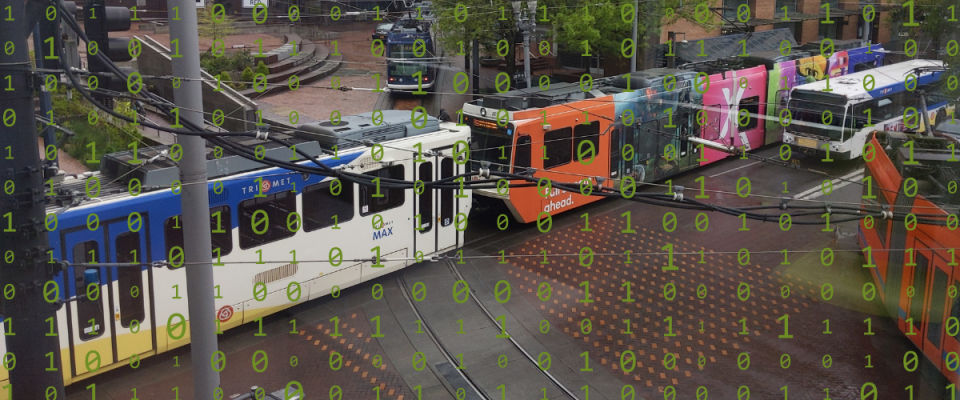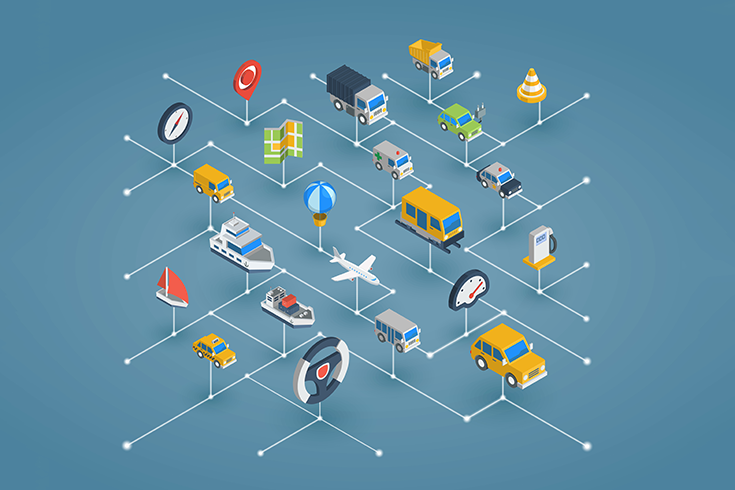
Portland State University’s Transportation Research and Education Center (TREC) maintains two large, public transportation data lakes: PORTAL and BikePed Portal. The latest round of funding for PORTAL, in the amount of $1.6 million, was awarded in February 2024 and will cover PORTAL’s activities through the next five years. BikePed Portal, too, recently received $100K for another year of funding, and both are the focus of some exciting innovations in transportation data.
The two centralized data repositories, unique both in their size and in the fact that they are accessible (PORTAL is freely available to the public, and BikePed Portal has limited public access as well), are supported by multiple federal, state, and regional agencies. Federal funding for PORTAL comes from the Federal Highway Administration (FHWA)’s Surface Transportation Block Grant (STBG) funding, suballocated by Metro’s Transportation System Management and Operations (TSMO) Program. Other funding sources include Vancouver Area Smart Trek (VAST), a program of the Southwest Washington Regional Transportation Council; Metro; TriMet; Oregon Department of Transportation (ODOT); Washington Department of Transportation (WSDOT); the National Institute for Transportation and Communities (NITC); Washington County; Clark County, the Clark County Public Transit Benefit Area Authority (C-TRAN); the City of Vancouver, WA and the City of Portland, OR. This ongoing support ensures that our transportation data team can continue to add functionality and make “the Portals,” as they’re collectively called, even more useful. The goal is to help transportation professionals make informed, evidence-based decisions to improve safety, mobility, and equity in transportation systems.

Aside from their obvious utility for transportation practitioners and researchers who need the data, the Portals offer a second benefit: Being housed at Portland State University, they connect students with hands-on practical experience and serve as a valuable educational tool.
Read on to learn about some brand-new features, goals for the future, and how PSU students have helped to create and shape the Portals.
In the near future we’ll be hosting some workshops offering data training, including SQL, R, Python, and how to use Application Programming Interfaces (APIs). If you’d like to be notified about a future workshop, fill out our Transportation Data Education form.
Join the Portal Users Groups (PUG) mailing list to take part in monthly meetings and learn how to get the most out of PORTAL and BikePed Portal.
What Makes the Portals Unique to PSU? A Brief Recap
As an urban research university, PSU strikes a dynamic balance between theory and practice. Having two giant data repositories, with users all over the globe, housed in the very same building where computer science students take their day-to-day classes is both beneficial and highly unusual. Moreover, all of the data is hosted on PSU servers and supported by the Maseeh College of Engineering and Computer Science’s Computer Action Team (CAT), which is well equipped to provide the type of technical support needed.
Bruce Irvin, a senior instructor of computer science in PSU’s Maseeh College of Engineering and Computer Science, leads groups of seniors each year in their capstone projects. Capstone students work with community clients on real-world projects, and it’s rare for such a large client to be so handily located.
“Most of our sponsors are not so close. They’re out in Hillsboro or in Salem, or sometimes even outside the state. Having the PORTAL team right there in the same building was really something. It speaks well for the development of entities like TREC within the university. That cross-pollination of the real world and the academic world is really useful and helpful, and wonderful,” Irvin said.
PORTAL was launched in 2003, and last year celebrated its twentieth anniversary. If you want to learn some fascinating details about how it works, you can watch the recording of a PSU Transportation Seminar: Celebrating 20 years of PORTAL (held in May 2023) which was presented by Basem Elazzabi and Tammy Lee.
Elazzabi is the head of programming and development for the PORTAL and BikePed Portal projects at TREC. He is responsible for maintaining and developing the infrastructure of both projects. He also does various data analysis and visualization tasks. He and TREC’s transportation data program manager, Tammy Lee, have greatly developed and enhanced the Portals’ capabilities over the past several years.
BikePed Portal was established in 2015 through a pooled fund grant administered by the National Institute for Transportation and Communities (NITC), in order to improve and promote the use of active transportation data. For an account of its history, features, and various use cases, check out a 2020 interview with Lee and TREC’s former associate director, Hau Hagedorn: The New BikePed Portal Dashboard: A National Non-Motorized Count Data Archive.
On The Horizon
As we continue to develop the Portals, we’re looking forward to incorporating some exciting new features, including enhancing BikePed Portal’s pedestrian volume estimation capabilities which will in turn help ODOT to build and maintain quality infrastructure for people walking and rolling.
TREC’s transportation data team has the ability to create custom interfaces for agencies, with exactly the features and numbers that they need. The team has created three transit-specific dashboards for TriMet, C-Tran and other agencies, which are capable of sourcing data from different places to show things like estimated load (how many people are riding transit) and seating capacity, alongside other metrics such as on-time performance. They’ve also developed a tool to annotate data, and the ability to add a correction factor to calibrated data.
The ability to create custom tools like this is one of the most powerful aspects of PORTAL and BikePed Portal, for agencies who want to use our data or share their own. Compared with applications such as ArcGIS, which is not designed for data-intensive uses, the PORTAL team is capable of working with large amounts of data and generating dynamic views built to users’ specifications, which can continually update with live data, and even combine sources to pull information from multiple datasets.
Where Do PSU Students Come In?
Since its inception in 2003, countless PSU students have contributed to PORTAL in some way. This past academic year, two groups of graduating seniors in the engineering program worked with Lee and Elazzabi for their capstone projects, advised by instructor Bruce Irvin. A number of Graduate Research Assistants (GRAs) have also helped to develop aspects of PORTAL and BikePed Portal.
During the winter and spring of 2023, undergraduate seniors Matthew Stevenson, Mohamed Al Zadjali, Mohamed A. Esmail, London Joseph, Nahom Ketema, Nicole Kurtz, Alessandra Wong, and Sam Ziegler worked to create a user interface for editing metadata in BikePed Portal. Lee felt that the collaboration was a win-win, helping both the students and the Portals.
“It was awesome that they were able to put something together and have something usable to integrate. The students were really good at communicating and keeping me up to date, and asked really good questions. They’re working on something that’s super tangible and has a lot of influence in the real world,” Lee said.
Bruce Irvin agrees that it’s good for the students to have a chance to tackle real-world challenges.
“What we look for in capstones is real projects for our students to collaborate on as a team. That’s where they get excited. They get real world experience. And PORTAL has provided a unique opportunity: experience with a real code base. In classroom projects, you know, the professor comes in and they have some canned problem for the students to solve. And they ask them to write code to solve that problem. Great for learning. But out in the real world, students almost never write code from scratch. They’re always extending, modifying, improving an existing code base. They have to learn it. They have to ask questions about it. They have to interact with it, and their code needs to work with it. So that is a big part of the benefit of working with PORTAL,” Irvin said.
Finally, the students also get the benefit of mentorship. Working with the PORTAL team, students gain access to the viewpoint of professionals and have a chance to build relationships with people working in their future career field.
By combining the goals of educating future professionals and improving public agencies’ access to high-quality transportation data, PORTAL and BikePed Portal together embody PSU’s “Let Knowledge Serve The City” motto and mission as an urban research university.
